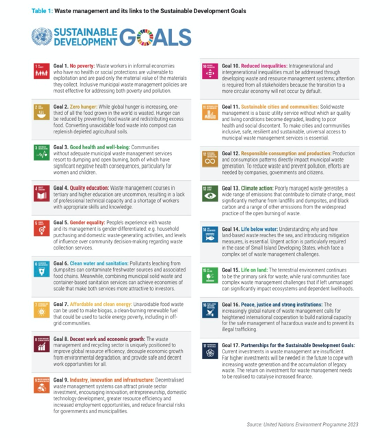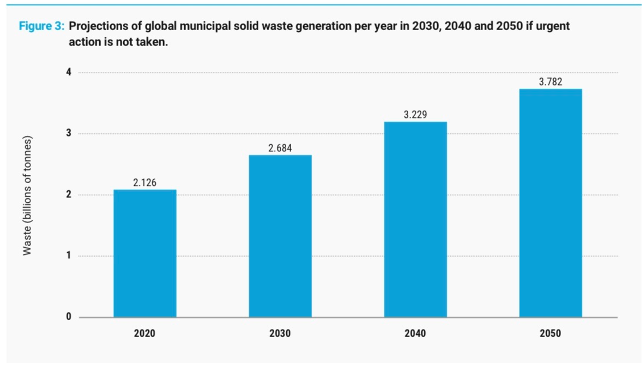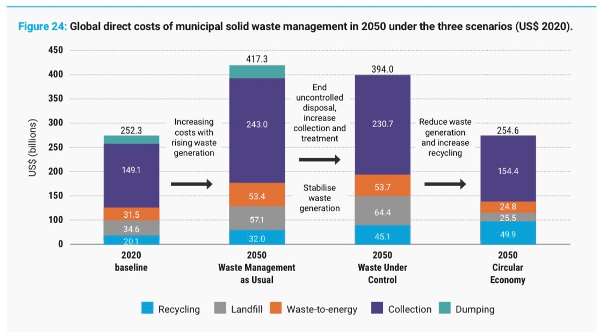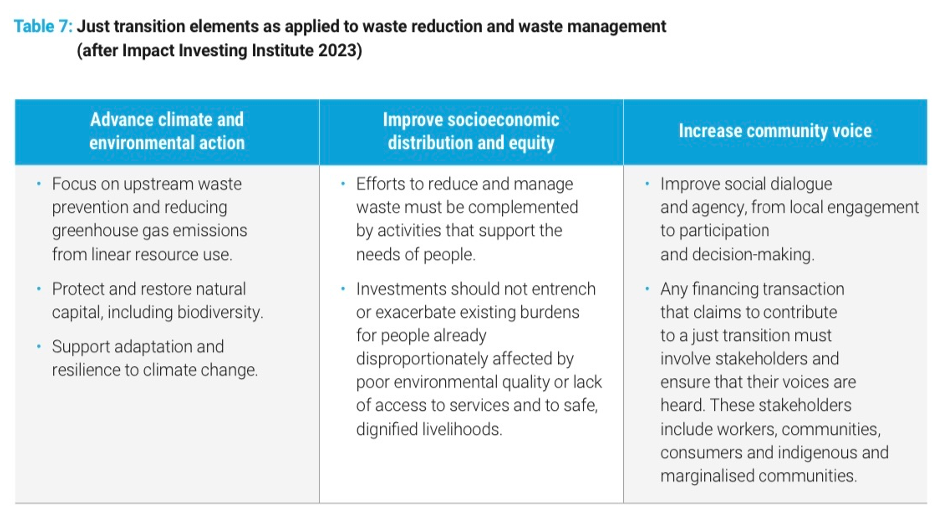

30/07/2024
Titled "Beyond an age of waste: Turning rubbish into a resource," the UNEP Global Waste Management Outlook (GWMO 2024) provides the most substantial update on global waste generation and the cost of waste and its management since 2018. The analysis uses life cycle assessments to explore what the world could gain or lose through continuing business-as-usual, adopting halfway measures, or committing fully to zero waste and circular economy societies. According to a new UN Environment Programme (UNEP) report, with municipal waste set to rise by two thirds and its costs to almost double within a generation, only a drastic reduction in waste generation will secure a liveable and affordable future.
Municipal solid waste generation, growth and management
This report focuses on Municipal Solid Waste (MSW), which is the waste generated by householders, retailers and other small businesses, public service providers and other similar sources. Managing MSW is generally a local service and is commonly the responsibility of local government. MSW is only a part of the story, since enormous amounts of non-municipal waste are generated each year.
MSW typically includes food waste; packaging; household items including broken furniture and electronic goods; clothes and shoes; and personal hygiene products. Its composition varies from place to place and may be affected by the time of year, weather conditions and economic recessions or other major events and trends.
The management of MSW poses unique challenges due to its sheer volume, continual growth, diverse composition, ubiquity in human settlements, variability and influence by cultural change, and the intricate web of social, economic and environmental impacts that arise from its management.
MSW management being delivered by municipal governments, formal and informal private actors, and civil society. Questions of global social and environmental justice also arise in discussions of municipal waste growth and its management, as illustrated by the many links with the Sustainable Development Goals (SDGs) (Table 1) (United Nations Environment Programme [UNEP] 2023).

Table 1: Waste management and its links to the Sustainable Development Goals
Source: The UNEP Global Waste Management Outlook
According to the report, municipal solid waste generation is predicted to grow from 2.3 billion tonnes in 2023 to 3.8 billion tonnes by 2050. In 2020, the global direct cost of waste management was an estimated USD 252 billion. However, when factoring in the hidden costs of pollution, poor health and climate change from poor waste disposal practices, the cost rises to USD 361 billion. Without urgent action on waste management, by 2050 this global annual cost could almost double to a staggering USD 640.3 billion.
Waste generation is intrinsically tied to GDP, and many fast-growing economies are struggling under the burden of rapid waste growth. By identifying actionable steps to a more resourceful future and emphasising the pivotal role of decision-makers in the public and private sectors to move towards zero waste, this Global Waste Management Outlook can support governments seeking to prevent missed opportunities to create more sustainable societies and to secure a liveable planet for future generations.

Figure 3: Projections of global municipal solid waste generation per year in 2030, 2040 and 2050 if action is not taken
Source: GWMO 2024
Notwithstanding the need for upstream measures to reduce waste and, ideally, decouple waste generation from economic growth, this report looks at how MSW is currently managed: Access to waste collection services varies significantly within and between regions. Reuse and recycling reduce demand for energy-intensive and environmentally damaging raw material extraction enable waste to be valued as a resource, and prevent pollution from waste leaking into the environment. Recycling is not the ultimate goal of waste management: it is always better to reduce waste by preventing it in the first place, or reuse materials that would otherwise become waste, than to produce waste and then recycle it. Waste-to-energy represents linear resource use since materials that are combusted can never be recovered and used again. A sanitary landfill is an engineered facility for the disposal of solid waste on land in a controlled manner. Dumpsites are prone to fires, which can smoulder continuously beneath the surface for months and can be very difficult and dangerous to extinguish.
Unsustainable consumption and production patterns result in increasing quantities of waste to manage, which in turn increase the direct costs to society. The analysis carried out for this report found that in 2020 MSW management globally cost US$252.3 billion. Improving waste management worldwide will require significant investments, by far the most affordable solution is to drastically reduce waste and value secondary materials as a resource.

Global direct costs of municipal solid waste management in 2050 under the three scenarios
Source: GWMO 2024
The GWMO 2024 is a guide and call for action to catalyse collective efforts to support bold and transformative solutions, revert the adverse impacts of current waste management practices, and provide clear benefits to every individual living on this planet. These actions are instrumental to accelerating the achievement of the 2030 Agenda.
The findings of this report demonstrate that the world urgently needs to shift to a zero waste approach, while improving waste management to prevent significant pollution, greenhouse gas emissions and negative impacts to human health. Pollution from waste knows no borders, so it is in everyone’s interests to commit to waste prevention and invest in waste management where it is lacking. The solutions are available and ready to be scaled up. What is needed now is strong leadership to set the direction and pace required, and to ensure no one is left behind.
Jointly published with the International Solid Waste Association (ISWA), the report provides an update on global waste generation and the cost of waste and its management since 2018. The analysis uses life cycle assessments to explore what the world could gain or lose through continuing business-as-usual, adopting halfway measures, or committing fully to zero waste and circular economy societies. The report also evaluates three potential scenarios of municipal waste generation and management, examining their impacts on society, the environment, and the global economy. Furthermore, it presents potential strategies for waste reduction and enhanced management, following the waste hierarchy, to treat all waste materials as valuable resources. To assess the potential impacts of MSW management to 2050, three scenarios were developed.

Source: GWMO 2024
Barriers to change
This report explores the reasons why, despite awareness of the global waste crisis, progress towards waste prevention and improved waste management is not occurring rapidly enough. For waste mangement systems to be effective and efficient, behavioural change may be required in hundreds of thousands of households. Insufficient attention to waste reduction is largely responsible for rapid waste growth globally. Many countries are unable to provide waste management services for all citizens.
Political leaders need to recognise the urgency of the waste crisis and its impacts on society. While municipalities are typically responsible for waste management, no single stakeholder has responsibility for waste reduction despite its clear public benefits and priority position on the waste hierarchy. Consequently, zero waste and circular economy business models that could help to decouple economic growth from waste generation have too often been considered secondary to waste management. It’s time to clean up our world, and make progress towards circular, zero-waste economies - for people and planet alike.
Waste generation can be decoupled from economic growth. The city of Kitakyushu in Japan stands out as an example of achieving waste reduction, with only 0,42kg of municipal solid waste generated per person per day. As an industrial city with significant pollution, Kitakyushu sought to apply an environmentally sound approach rather than a disposal-focused one. The main drivers of its efficient waste management system cover all steps from start to end points: sorting of waste at the source, composting widely at the household level, recycling and heavy engagement of citizens. These measures are complemented by financial incentives to reduce waste through volume-based waste user fees rather than flat fees per household. Over time, Kitakyushu has also created an eco-town to increase environmental awareness and recover materials from many types of waste, including cars and appliances.
In many countries, most urban waste collection and transportation are carried out by the informal recycling value chain, helping cities to save money. However, many policymaking and infrastructure development projects fail to harness this local expertise. Without hearing the voices of this existing workforce, potential system design improvements may be missed while the negative consequences of policies and infrastructure may be overlooked (UNDP 2022).
Returnable plastic packaging can achieve meaningful environmental benefits compared to single-use plastic packaging, with the potential to reduce emissions and water use by 35% - 70%.
The aim of this report is to make clear the shared direction in which countries need to travel so as to become more resource efficient, and to have better public health, and to offer actionable pathways to deliver change at pace. Countries with the least formal waste management systems have perhaps the most to gain from digitalisation. All countries can take steps towards ensuring goods and services are provided in such a way as to avoid unnecessary waste.

Source: GWMO 2024
Recommendations
We need to act now in order to avoid the worst scenario. The report provides guidance and suggested actions for multinational development banks, national governments, municipalities, producers and retailers, the waste management sector as well as citizens. The following recommendations therefore focus on the shape of that leadership, including how governments and industry can engage to create the enabling conditions for a circular economy, and ultimately zero-waste societies.
Multinational development banks, donors and philanthropic organisations: Recognise the importance of integrating improved waste management zero-waste waste and circular economy strategies; identify proven solutions and support their replication and scaling up in different cities, countries and regions; share lessons learned openly so that repetition of failures can be avoided and successes replicated; take into account the track record of a particular solution when assessing proposals so that the most effective approaches are those that receive the greatest support; require governments, municipalities and other partners to collect gender-disaggregated data on experiences with and impacts of waste, to better inform policies and other interventions.
National governments: Legislate for the waste hierarchy; pursue all opportunities to encourage waste reduction and circular economy initiatives at a national and sub-national level, for example by introducing incentives for zero waste service delivery models, and modulated fees that promote waste reduction in producer responsibility schemes; integrate policies for waste management and circular economies to prioritise waste reduction and maximise the value of secondary resources within society; use national legislation to protect the rights of the informal waste sector and ensure their support and involvement in developing waste management services; legislate for equal access to a waste management service; provide guidance for municipalities in how to provide waste services economically and effciently, including by encouraging citizens to reduce waste, reuse and recycle within the home; provide guidance for municipalities in waste management system design, ensuring inclusion and representation from women and the informal sector, and that systems are tailored for the needs of the local community; build national waste management and circular economy expertise; pursue opportunities to share knowledge and learn from other countries with similar contexts.
Municipalities: Cooperate between municipalities to share and replicate good practice and achieve economies of scale in service delivery; recognise the specifc experience and expertise of both women and the informal sector and to advance waste reduction and involve them in waste management service design; lead by example in the community by identifying opportunities to drive resource effciency; raise awareness through positive and targeted messaging; and make it easy for residents and local businesses to reduce waste and participate in waste segregation programmes; encourage residents to reduce waste and where possible manage waste in the home; involve the local community and provide meaningful opportunity for feedback on waste reduction and waste management strategies; ensure systems are co-designed with service users to promote ownership and accountability and to embed behaviour change; be patient and stay motivated - behaviour change around waste reduction and waste segregation takes time and consistency; keep going one step at a time.
Producers and retailers: Recognise the vital role and responsibility of the private sector in waste prevention; take responsibility for waste generation and respond to society’s demands and needs to reduce the resource-use footprint of commercial activities; pursue business models that achieve fnancial savings through resource effciency, such as refll, deposit return and design-for-recycling; support governments with efforts to regulate waste generation, recognising that regulation creates a level playing feld and gives certainty; favour regulation over voluntary targets which only add to uncertainty; avoid greenwashing.
Waste management sector: At all times seek opportunities to move waste management practices up the waste hierarchy; use expertise about material resources to support waste reduction, resource effciency and circular economy models; help governments and municipalities to design systems that are locally appropriate and can be adapted to meet the changing needs of society.
Citizens: Pursue conscious consumerism, buying only what is needed and avoiding goods that are over-packaged, unnecessarily single-use or have a short lifespan; use refll and deposit return schemes where they exist; where possible, reuse and recycle at home to reduce waste and its burden on municipalities and the environment, for example by home composting; segregate unavoidable waste into three streams for its economical and sustainable management: food and garden waste, dry and clean recyclables, and residual waste; use consumer power to infuence business practices; support local businesses that offer goods and services in a way that promotes zero waste and a circular economy
The Global Waste Management Outlook 2024 echoes the first GWMO’s call to action to scale up efforts to prevent waste generation; to extend adequate safe and affordable MSW management to everyone worldwide; and to ensure that all unavoidable waste is managed safely.
Nhâm Hiền
Source: The UNEP Global Waste Management Outlook